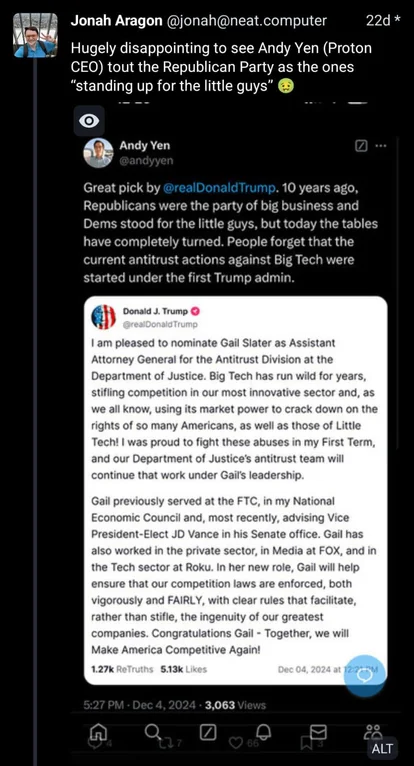Proton
Empowering you to choose a better internet where privacy is the default. Protect yourself online with Proton Mail, Proton VPN, Proton Calendar, Proton Drive. Proton Pass and SimpleLogin.
Proton Mail is the world's largest secure email provider. Swiss, end-to-end encrypted, private, and free.
Proton VPN is the world’s only open-source, publicly audited, unlimited and free VPN. Swiss-based, no-ads, and no-logs.
Proton Calendar is the world's first end-to-end encrypted calendar that allows you to keep your life private.
Proton Drive is a free end-to-end encrypted cloud storage that allows you to securely backup and share your files. It's open source, publicly audited, and Swiss-based.
Proton Pass Proton Pass is a free and open-source password manager which brings a higher level of security with rigorous end-to-end encryption of all data (including usernames, URLs, notes, and more) and email alias support.
SimpleLogin lets you send and receive emails anonymously via easily-generated unique email aliases.
view the rest of the comments

Posteo
Keep a proton for situations where you can actually use the encryption. Most of the time the encryption is as useless as a VPN.
Also keep in mind all it is is pgp with a directory lookup. I think proton made their pgp directory lookup more open in the last few years, so it may not have any real benefits.
Better idea: Use Tuta and always have the encryption. Recommending unencrypted email services in 2025 feels like a bad joke to me.
Can you elaborate on the uselessness of a VPN?
This is common debate and there's plenty of angles to it. VPN companies are definitely guilty of fear mongering in their advertising and trying to market them as an easy way to achieve privacy or anonymity, which is false. Tom Scott's video covers this well. This overview is also pretty good at explaining what it is and isn't. If you don't trust your ISP or are using public/free wifi, VPNs can be useful. VPNs aren't inherently trustworthy either, though, especially free ones that might be harvesting your data. Even a well-intentioned VPN that doesn't retain logs can rent servers that government entities can (theoretically) bug to get your data (if they really wanted to).
Do you know of a reason to trust your ISP?
It's all contextual I think. I'd rather use my ISP than use and support a bad VPN. If you're using your work's wifi using a VPN could get you flagged.
Work is using my wifi. But it has its own VPN anyway.
Almost every site is https, so it's already encrypted. DNS lookups are encrypted. So what a VPN does is prevents your isp from knowing you visited a specific website. There was already no way for them to know what you got from that website, the only additional security was knowing you visited.
If this is a concern, a VPN isn't useless, but for most that isn't a concern.
VPNs are also good for torrents and bypassing rate limiting.